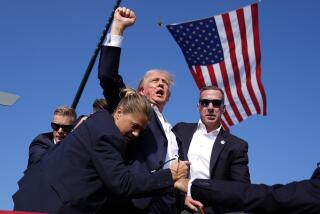Answering Protests, Retailer to Pull Line of T-Shirts That Mock Asians
- Share via
SAN FRANCISCO — SAN FRANCISCO -- Amid mounting protests, college clothier Abercrombie & Fitch on Thursday said it will pull a line of T-shirts from stores nationwide after complaints that they depict racist caricatures of Asian Americans.
The $25 T-shirts show cartoonish Asian characters with slanted eyes and conical hats who serve as pitchmen for companies such as restaurants, dry cleaners and bowling alleys.
One portrays a man pulling a rickshaw with the words “Rick Shaw’s Hoagies and Grinders. Order by the foot. Good meat. Quick feet.” Another shows two Asian men at “Wong Brothers Laundry Service” and carries the logo “Two Wongs Can Make it White.”
A&F;, which markets shorts, T-shirts and other casual apparel to youths between the ages of 18 and 22, said it made the decision after receiving “hundreds and hundreds” of complaints about the T-shirts.
The items have been on the shelves for nearly two weeks, but the firestorm hit within the past couple of days, mostly a result of rapid-fire e-mails delivered to dozens of people at once.
Thomas D. Lennox, A&F;’s senior manager of investor relations and corporate communications, said the company decided to pull the roughly five styles from its Web site and stores Thursday.
“It’s not, and never has been, our intention to offend anyone,” Lennox said.
“These graphic T-shirts were designed with the sole purpose of adding humor and levity to our fashion line,” he said.
Tom Goulet, manager for customer services at the company’s New Albany, Ohio, headquarters, said A&F; would note in its catalog and nationally circulated magazine that the shirts were no longer available.
But though complaints have been many, Goulet added that A&F; was also receiving a sizable number of calls from people who wanted to buy the shirts.
At one Abercrombie & Fitch store in San Francisco on Thursday, sales of the shirts remained brisk and a man who identified himself as a store manager said he had received no word from company headquarters to stop selling the shirts.
“I don’t understand what the big problem is,” he said. “The first kid to come in and buy these shirts this week had the last name of Wong.”
Nearby, people rushed to rummage through shirts that filled a table as though a Kmart blue-light special had just been announced.
When asked if the shirts were selling well, one female clerk responded, “Oh my Lord yes! We don’t have any more in back stock. They’re jumping off the shelves.”
But not everyone was pleased. Asian American activists in San Francisco picketed one downtown store Thursday evening and presented a letter demanding that the shirts be pulled from shelves and that the company publicly apologize.
Word of the shirt line spread quickly this week via e-mail to college campuses, including Stanford University and UC Irvine, where students plan to discuss the matter at a meeting Sunday night.
The shirts were also a topic on several Bay Area-based Web sites.
“We think it’s inappropriate for this company to make a profit from these really negative, harmful and hurtful images of Asian Americans doing work they have been historically forced to do,” said Jane Kim of the Chinatown Community Development Center.
“These are the kind of images we saw in California newspapers a century ago. I think the company needs to do some major community relations work,” Kim said.
“Maybe they need to invest in some of the work the Asian community is doing rather than peddling these really hateful images,” Kim said.
Goulet said Asian Americans misunderstood the marketing campaign, which in the past has poked fun at women, Irish Americans and snow skiers.
“Anyone who buys our clothes knows we don’t target any particular race,” he said.
“We pretty much make fun of everybody. But if we’ve learned anything from this it’s that perhaps we need to get a little community feedback before we rush to market,” Goulet said.
Abercrombie & Fitch is familiar with controversy.
But until this incident, most complaints came not from A&F;’s target young-adult customers, but from parents, who objected to what they considered overly sexual images in store ads and marketing materials.
With this group of shirts, however, the company has angered some of its core audience: college students.
One of the shirts recently removed from the market shows a smiling Buddha figure with the words “Buddha Bash: Get your Buddha on the Floor.”
Another shows a caricature of an Asian man bowling, with the words: “Wok-N-bowl.”
“The Buddha is a religious icon that’s central to the Asian culture,” said Kim.
“What makes us so angry is that even if they say they’re going to pull these shirts from the shelves, the images are already out there. The damage has been done,” she added.
Started in 1892 with one store in New York City, Abercrombie & Fitch has grown into a national chain with $1.3 billion in annual sales in 311 stores--31 in California, three of which are in Los Angeles.
At A&F;’s store on Market Street in San Francisco, customer Henry Kemp shook his head in disbelief as shoppers bought as many as half a dozen of the shirts.
“It smacks of Charlie Chan and the coolie stereotype,” he said.
“I can’t believe that anyone would buy these shirts, especially in this politically correct town,” Kemp said.
Pam Noli, whose company offers seminars on racism at Bay Area public high schools, was buying several of the shirts to use in her demonstrations. “It’s outrageous,” she said.
“When people say there’s no longer any overt racism today, all I have to do is pull out one of these T-shirts,” she said.
“How could a company be so insensitive in the year 2002 to think this kind of smear campaign could fly?”
Nearby, Kemp sarcastically told a salesclerk: “Hey, why not start a whole theme with T-shirts that insult every race? You people could become instant millionaires!”
As he bought several of the shirts, Derek Clark said the critics needed to lighten up.
“I’m buying these for my Asian friends, and we may wear them on our bowling team this year,” he said. “I mean, please, everybody gets picked on these days. Why should Asian Americans be any different?”
Lela Lee, a 27-year-old Los Angeles cartoonist best known for her “Angry Little Asian Girl” character and merchandise, said images like the ones on A&F;’s shirts inspire her work.
“We’re used to depictions of Asians as kung-fu fighting, fortune-cookie-speaking, slanty-eyed, bucktooth servants,” she said. “We’re really tired of it.”
*
Times staff writer Leslie Earnest contributed to this report from Costa Mesa. Goldman reported from Los Angeles.
More to Read
Inside the business of entertainment
The Wide Shot brings you news, analysis and insights on everything from streaming wars to production — and what it all means for the future.
You may occasionally receive promotional content from the Los Angeles Times.











